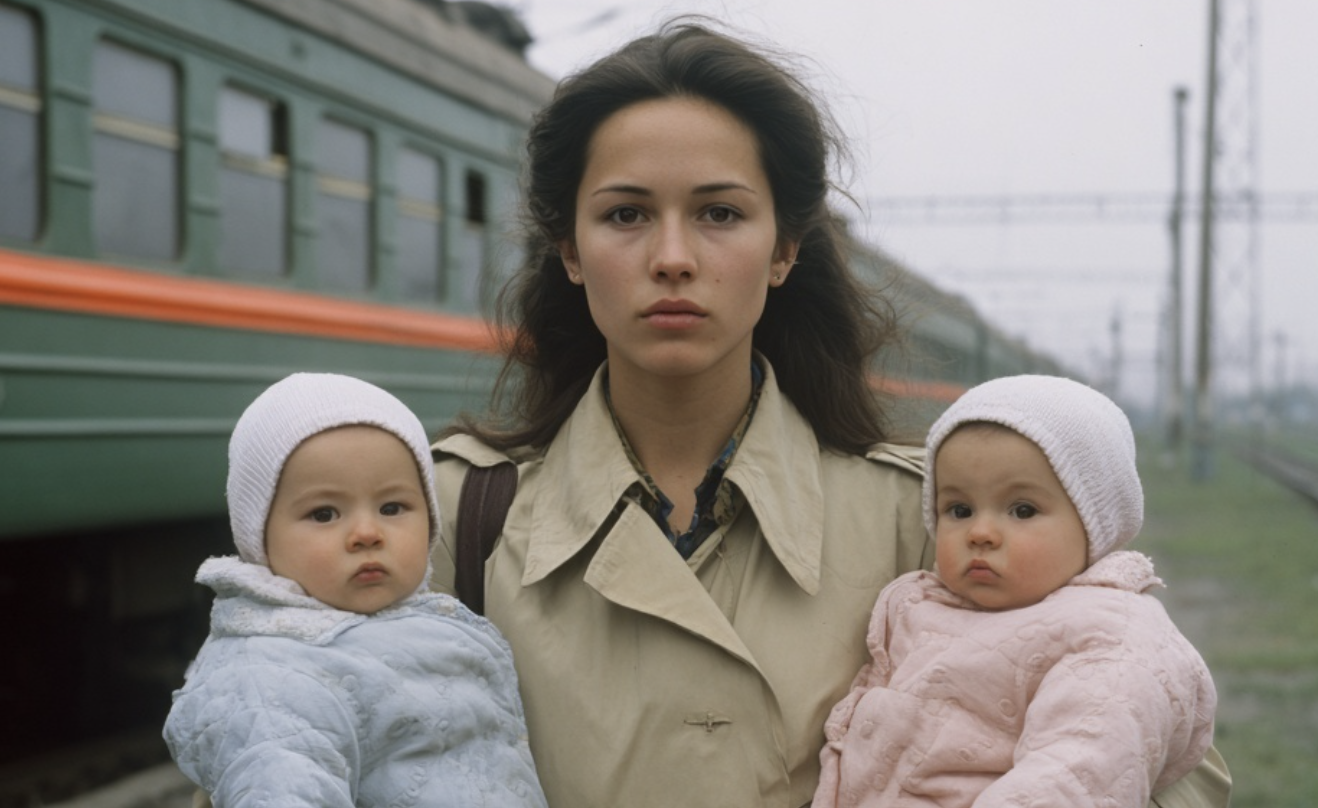On a commuter train, on a gray, rainy day, a stranger handed me two babies—and vanished. Sixteen years would pass before I learned the truth. In the letter were keys to a manor… and a fortune that took my breath away.
“Out in this weather—and by train?” the conductor raised her brows in surprise as she met Elena on the platform.
“To Olkhovka. Last car,” Lena nodded briefly, handing over her ticket and struggling to lift her heavy bags.
The train shuddered, the wheels squealed. Outside the window drifted rain-blurred landscapes: fields drowned in water, warped sheds, the occasional village house, as if washed by the gray streams of the sky.
Lena sank onto the seat with relief. The day had been exhausting—shopping, standing in lines, heavy bags… all after a restless night. The marriage had lasted three years, but there were still no children for her and Ilya. Her husband supported her and never reproached her, yet Lena felt herself drifting deeper into a shadow of doubts and hopes.
The morning’s conversation surfaced in her mind.
“Everything will be all right,” Ilya had said, hugging her. “Our miracle is still ahead.”
His words warmed her like hot tea on a foul day. He’d come to the village as a young agronomist, stayed, fallen in love—with the land, the work… and with her. Now he ran a small farm; she worked as a cook in the local canteen.
The creak of the door broke her thoughts. In the aisle stood a woman in a long dark hooded cloak. In her arms—two neatly wrapped bundles. From beneath the blankets, tiny faces peeked out. Twins.
She silently surveyed the car, then approached Lena.
“May I sit?”
“Of course,” Lena said, shifting over.
The stranger sat, cradling the children carefully. One of the babies began to whimper.
“Hush, my sweet,” the woman whispered, rocking him. “It’s all right.”
“They’re adorable. Both boys?”
“A boy and a girl. Vanya and Marusya. They’ll be a year old soon.”
Lena’s heart clenched. She longed to hold a child of her own, but fate had other plans.
“Are you going to Olkhovka as well?” she asked, to distract herself from the ache.
The stranger didn’t answer. She only turned to the window, where the rain was erasing the shapes of the world.
Minutes passed in silence. Then came a voice:
“Do you have a family?”
“A husband.” Lena’s fingers brushed her ring.
“Does he love you?”
“Very much.”
“Do you want children?”
“I hope for them every day…”
“But it hasn’t happened yet?”
“Not yet…”
The woman drew a deep breath. Then, suddenly leaning closer, she spoke in almost a whisper:
“I can’t explain everything. But you… you’re not like the others. They’re watching me. These children are in danger.”
“What are you talking about? You need to go to the police!”
“Under no circumstances!” she cut her off sharply. “You don’t understand… they want to take them.”
The train began to slow.
“Please…” her voice trembled. “If you don’t take them now… they will die.”
Lena had no time to say a word. The woman quickly placed the babies in her arms, thrust a small backpack into her hands—and in the next second slipped out the door.
“Wait!” Lena cried, rushing to the window. “Come back!”
A figure darted along the platform… and disappeared into the crowd. The train lurched forward. The babies started crying.
“My God…” Lena whispered. “What do I do now?..”
Chapter 2. Sixteen Years Later
Olkhovka. The same rural station, only faded and half-ruined. The ticket machine no longer worked; the ticket office had been closed for ages. A woman in a gray hooded coat stepped onto the platform with two teenagers—a tall, thoughtful-eyed boy and a fair-haired, freckled girl with her hood perched on the crown of her head.
“Mom, are you sure we’ve got the right place?” the boy asked.
“Absolutely, Vanya.” Lena tightened her grip on the envelope that had arrived a week earlier. There was no return address, only her name and a postmark: Moscow.
Inside was a short letter:
“You saved them. Now it’s time to learn the truth. These keys are to their inheritance. The address is below. Don’t be afraid. Everything I couldn’t say then will be revealed now.”
The envelope contained two keys: one old, heavy, wrought with ornament; the other ordinary—a safe key. And a scrap of paper with an address: “Old Kiselev Farmstead. House 4.”
Her head swam. In all these years she had never learned who that woman was. Not a trace in any station, any archive. The infants had been perfectly healthy. She had filed for guardianship, then adoption. Ilya had accepted them without hesitation. They became a family.
But Lena had always kept the backpack. And now—this letter. An answer.
The road to Kiselev was hard: their old Niva barely slogged along the muddy track. At last a house appeared on the horizon—a manor overgrown with grapevines, with a high roof and a half-collapsed veranda.
Vanya was the first to jump from the car and push the gate. It creaked like in a horror film.
“All of this is… ours?” Marusya breathed.
“Looks that way,” Lena replied, fitting the old-fashioned key into the lock. A click. The door swung open.
The smell of old wood, damp plaster, and… roses.
“Someone lives here,” Lena whispered. “Or lived here recently…”
The house greeted them with silence and dust. In the sitting room—antique armchairs, a gramophone, portraits on the walls. On one of them—her. The woman from the train. In the same cloak.
Lena stepped closer. On the back was written:
“Ekaterina N. Lobanova. 1987.”
On the table—an note.
“Have they grown? I hope they’re happy. Everything here belongs to them. The rest is in the safe. The codes are their birthdays.”
Marusya figured it out quickly: Vanya’s was 03.04, and hers—03.04 as well. The code: 0304.
Inside the safe lay documents, bank accounts… and a thick folder labeled: “Operation Harmony.”
Chapter 3. Who Was She?
They spent two days in the house, combing through the papers. Ekaterina Lobanova had been an employee of the Research Institute of Genetic Medicine. Officially the institute closed in 1995, but according to the papers, experiments continued in secret—on newborns. The goal: to create a generation with heightened cognitive and emotional resilience. Children capable of “seeing” emotions and sensing danger in advance.
Ivan and Marusya were the result of these experiments. Their mother, Ekaterina, fled when she realized the children were to be used for military purposes.
She hid for ten years, but at some point realized they were in mortal danger. That was when she entrusted them to Lena—trusting a feeling she couldn’t explain.
The last letter, tucked in the bottom of the safe, was handwritten:
“Lena. I knew you would give them what I couldn’t—childhood and love. I watched from afar. I didn’t dare interfere. But now—you must know. All this belongs to them. They are special. But most of all, they are yours.”
Lena’s hands trembled. Marusya and Vanya looked at her in silence. And then for the first time she said:
“You have always been my children. But now… now you are the heirs of a destiny.”
Chapter 4. Coming Home
They returned to Olkhovka different people. They decided to keep the old manor as a summer house. Marusya dove into the archives; Vanya into restoration. Lena opened a small bakery.
A month later, another letter arrived. No stamp, no address. Inside, only a line:
“I am near. And I always will be. — Mama.”
Chapter 5. Shadows of the Past
A week passed. Life began to settle into a familiar rhythm: the bakery ran, the kids returned to online studies, the manor was slowly being cleared of dust and memories. But Lena found herself more and more uneasy. Who had sent the letter? Was that woman—Ekaterina—still alive? And most importantly—was it truly over?
One night, with wind whipping shreds of fog across the windows, Lena woke to the faintest sound. A rustle, like footsteps… or paper brushing. She got out of bed and stepped quietly into the hallway. On the stairs stood Marusya. Pale, with trembling hands.
“What’s wrong?” Lena rushed to her.
“I…” The girl held out her hand. In her palm lay a new envelope. “It was at my door. Under the mat.”
Lena took it. The paper was cold, slightly damp from the morning dew. Inside—a photograph. Old, black-and-white. Ekaterina held the infants in her arms. Beside her stood another person—a man in a lab coat. The face was blurred, but on the back was written:
“They’re still looking for them. I’m trying to throw them off the trail. But time is running out.”
And the signature: “N.”
“Who is that?” Marusya whispered. “What does it mean?”
“It means… they’re still watching,” Lena whispered, pulling her daughter close.
Chapter 6. A Trip to Moscow
The next day they decided to go to Moscow. To the archive of the former institute. Back to where it all began. Ilya insisted Lena not go alone—Vanya went with her.
The search was hard. The institute had long ceased to exist, but through old contacts, Vanya found a professor who had once worked there. His name was Arkady Nikolaevich. The old man received them in his small apartment on the outskirts of Moscow, among books, flasks, and the smell of mothballs.
“Ekaterina…” he sighed, seeing the photo. “She was the best of us. But too human. In the end, that’s what saved your children.”
“What do you know?” Lena leaned forward.
“I know the ‘Harmony’ project was part of a program called ‘Evolution,’ developed for the needs of intelligence services. Ekaterina stole the children and disappeared. I helped her—with forged documents. After that, everything shut down. And now you say you’re being watched?…” The old man lowered his eyes. “Then someone wants to start it all again.”
“Who is ‘N.’?” Vanya asked sharply.
Arkady flinched. After a pause, he said:
“He was called Nesterov. He was the ideologue of the project. But he disappeared many years ago. I thought he was dead… Seems I was wrong.”
Chapter 7. In the Trap
When they returned home, Lena noticed odd little things: tracks on the gravel, an unfamiliar car at the edge of the village, a knocked-out security camera.
One evening, when Ilya had gone to the farm and the children were studying, the doorbell rang. A man in a long black coat stood on the threshold. His eyes were cold and clear.
“Good evening,” he said politely. “I am Dr. Loginov. A colleague of Ekaterina’s. She gave me your coordinates in case something happened to her.”
“What do you want from us?”
“To allow the children to undergo an examination. Routine. No danger. It’s for their own protection.”
“Leave,” Lena said firmly.
“You have no choice,” he replied coolly, and without waiting for an answer, melted into the darkness.
That very night they left. They took what they could. Everything else they abandoned. They could no longer stay in Kiselev. Now every step could be tracked.
Chapter 8. A New Life
They settled in a border village near Finland, with Ilya’s relatives. There, among forests and rivers, they began again. Lena took a job teaching at the local school; Ilya kept working the land. The kids studied remotely.
And yet the fear didn’t vanish. Especially for Marusya. She complained more and more often of headaches, of strange dreams in which unknown people in white led her through sterile halls.
Vanya, by contrast, began seeing numbers. He could anticipate events, as if he sensed where an error would occur.
One day he said:
“Mom… what if we aren’t just children? What if we’re… the final stage of something larger?”
“Don’t think about that,” Lena pulled him close. “You’re my son. And that’s all that matters.”
Chapter 9. The Last Letter
Six months later, the last letter arrived. This time without an envelope. Just a sheet slipped into a box of groceries from the village store. On it—a child’s drawing: a house, a woman, two children, and the words:
“I am always watching over you. And if they come again—I will stop them. N.”
Vanya stared at the drawing for a long time. Then he said:
“He’s protecting us. Or… preparing us to someday take his place.”
Lena squeezed his hand.
“Not now. Right now—you’re just a teenager. And you deserve to live. Without fear. Without experiments.”
Epilogue. Years Later
Marusya entered university. Vanya became a scientist. Both carried within them something even the best minds couldn’t explain—a gift or a burden passed down through fear, blood, and love.
But at the core of their lives was always Elena. The woman who had once simply taken a train to Olkhovka… and became a mother by the call of her heart.
And somewhere, amid many lives, in the shadow of trees and memory, Ekaterina still lived. A woman whose motherhood was both sacrifice and victory.
Chapter 10. The Gene That Doesn’t Sleep
Another six years passed. Maria—or, as she now preferred to be called, Maru—was finishing a master’s in neuropsychology. A university in Switzerland offered her an internship in a private laboratory. She didn’t know that in the shadows of that offer stood the same force that had hunted their DNA years before.
At the same time, Ivan was working on his own project—a system for analyzing probabilistic scenarios of human behavior. Since youth he had “seen” patterns: as if reality could arrange itself into thousands of designs, and he knew which one would come to pass.
He tried to convince himself it was only heightened intuition. But deep down he understood: something he feared was awakening in him.
One evening, Maru received an email. The sender—unknown. Only a short line:
“You are not just a person. You are a result. But you have a chance to change the outcome. Meet me. Geneva. Rue Saint-Joseph, 14. — N.”
She stared at the screen for a long time. Her heart pounded. The name… him again. Or it. Or them?
That very night she packed.
Chapter 11. The Cellar of Truth
The building at Rue Saint-Joseph, 14 turned out to be an old mansion. Stone walls, iron shutters, a keypad lock. As soon as Maru entered the digits of her birth date, the door opened.
Inside smelled of damp and metal. She went down a narrow corridor. In the cellar, a gray-haired man with clear eyes sat at a table in a gray jacket.
“You… Nesterov?” she asked softly.
“One of those once called that. Though the name has long been dead. Call me simply Konstantin.”
“What do you want from me?”
“I didn’t come to take you, but to warn you. The ‘Harmony’ project is being revived. But not for peace. They want to turn your generation into a weapon. And you have a choice. Run, like your mother. Or take control.”
“Is she… alive?”
“No. But before she died she left all rights to the archive to you. You are the heir. And if you don’t decide, others will.”
Maru trembled. Everything she had considered past was present again. But she was no longer the same girl. She understood that running would no longer save them.
“I agree. But I want to know everything. And I want my brother to know.”
“He is already on his way,” Konstantin said calmly. “He received a letter too.”
Chapter 12. DNA Activation
A day later the siblings met again in the same cellar. Konstantin laid folders before them, labeled:
“Project: G2. Activation Protocols. Repository 3.”
“Your DNA contains fragments embedded during pregnancy. They activate under certain stress—loss of loved ones, extreme threat, powerful emotional surges. We wanted to create ultra-adaptive people. Ekaterina stole you because she realized the aim was to make you not persons, but a program.”
“And now…?” Ivan clenched his fists.
“Now they will seek you. And use you, unless you make the first move. But you have one advantage: you sense each other. We called it the ‘paired neural circuit effect.’ When one is in danger, the other feels it physiologically. You’ve experienced this already.”
“Yes…” Maru whispered. “When I felt bad, he would wake in the night. And the other way around.”
Konstantin studied them intently.
“You are not victims. You are keys. Just don’t let anyone turn you into locks.”
Chapter 13. The Decision
The return home was heavy. Lena, threads of gray in her hair, waited on the old veranda in Kiselev, where they had secretly come back.
“Mom…” Maru whispered, pressing herself to her.
“I knew the day would come when you learned everything. But I prayed you would remain simply my children.”
“We are your children,” Ivan said firmly. “But now we want to protect what you built.”
They chose the impossible: to publish everything. The archives, documents, protocols. Through trusted channels in the international press. The Geneva lab was exposed; dozens of children were freed from experiments. For the first time, the world heard that science had gone too far.
Ivan gave talks at forums; Maru advised UN committees on bioethics. Konstantin vanished, as if dissolved into shadow.
But letters from him still came. Without a signature. Only the phrase:
“You are light in a corridor that held only mirrors.”
Epilogue. Calm
Three years passed. The house in Kiselev filled with life again. Lena planted flowers, Maru cooked dinner, and Ivan sat on the veranda reading. His son—his firstborn—dozed on his lap.
“Daddy,” the boy murmured without opening his eyes, “I know you’re always with me, even when I’m in the dark.”
“Of course,” Ivan smiled. “We’re always near. It runs in the family.”
And at that moment, far away, beyond mountains and screens, someone who had watched over them all their lives closed the last folder with relief.
The system no longer needed control. Because the most important thing in it had awakened: a conscience.


